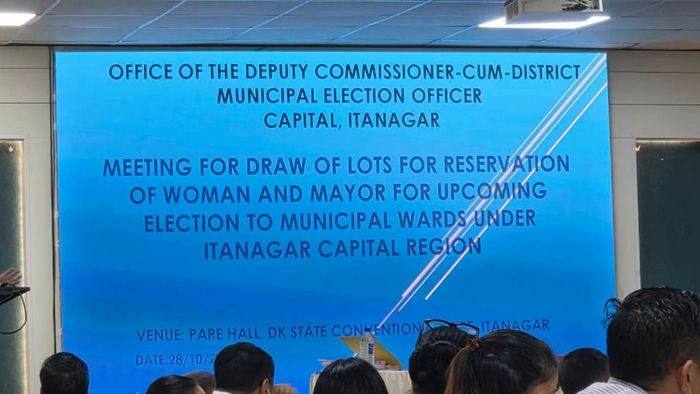Seven wards reserved for women in Itanagar Municipal Corporation ahead of December polls
In a significant step toward promoting women’s participation in local governance, seven out of twenty wards in the Itanagar Municipal Corporation (IMC) have been reserved for women corporators ahead of the upcoming municipal elections scheduled for December 2025.

- Oct 28, 2025,
- Updated Oct 28, 2025, 4:19 PM IST
In a significant step toward promoting women’s participation in local governance, seven out of twenty wards in the Itanagar Municipal Corporation (IMC) have been reserved for women corporators ahead of the upcoming municipal elections scheduled for December 2025.
A draw of lots to determine the women-reserved wards was conducted on Tuesday at the DK Convention Hall in Itanagar under the supervision of the State Election Commission (SEC). The process was part of ongoing preparations for the rural and urban local body polls across Arunachal Pradesh.
As per the results of the draw, Wards 1, 3, 5, 7, 8, 18, and 20 have been designated for women candidates, ensuring compliance with the mandatory one-third reservation policy for women in local bodies. The remaining wards will remain under the general category.
Also Read: Arunachal pushes educational growth with new infrastructure in Changlang
The meeting witnessed the presence of senior officials, local stakeholders, and Itanagar MLA Techi Kaso, who attended the draw for the reservation of women seats and the Mayor’s post for the upcoming urban local body (ULB) elections. Officials reaffirmed that the lottery process was conducted in a transparent manner, reflecting the commission’s commitment to fair and inclusive electoral practices.
The State Election Commission is expected to issue the formal poll notification by October 30, after which the Model Code of Conduct will come into effect across the concerned municipal and panchayat areas.
The December elections will mark a major exercise in strengthening grassroots democracy in Arunachal Pradesh, covering both Panchayati Raj institutions and municipal bodies, and are expected to pave the way for greater women’s representation in local governance.